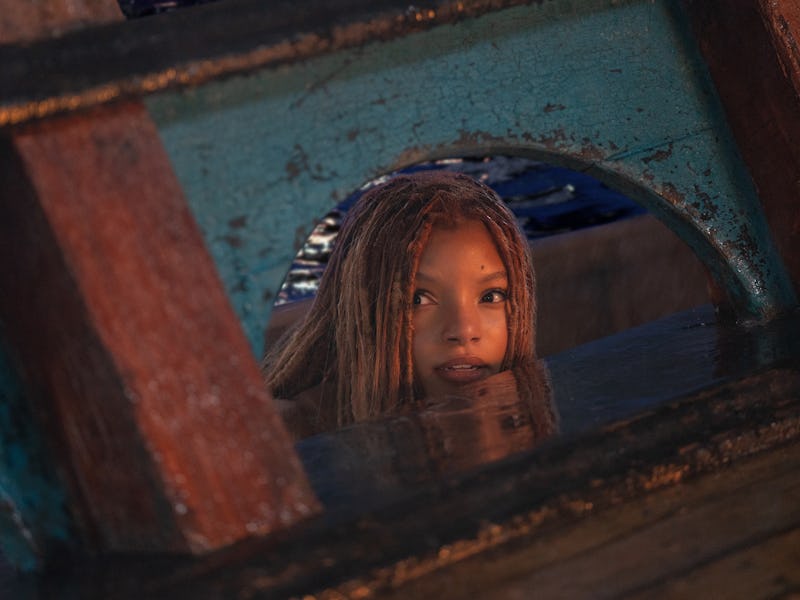Disney's Big New Movie Borrows a Brilliant Trick from Black Panther
The Disney remake takes a page from Black Panther and Bridgerton, but something’s missing.

Before anyone had even seen Disney’s fresh take on The Little Mermaid, the live-action remake was swathed in a cloud of controversy. Halle Bailey’s casting felt like a challenge to the image of the white, red-headed mermaid everyone spent their formative years watching. For the first time, Princess Ariel would be Black — and there was no reason for her not to be. Disney has remixed their established IP before with colorblind casting, and often to great success. But “fans” were absurdly protective over the character from the 1989 cartoon — that, or incensed by the apparent assault on their culture.
Most of us saw their meltdown for what it was. Representation and tolerance have never been a part of their world — but that’s exactly what might have inspired The Little Mermaid to build a new one. Director Rob Marshall takes a page from colorblind historical fantasies like Bridgerton in crafting the world of the his remake. Yes, Ariel is Black, but she’s not the only fresh face under the sea. Her underwater kingdom is much more diverse this time around; her sisters each hail from a different corner of the world, and the kingdom of Atlantica is similarly populated. It’s a choice that also invokes the colorblind cast from another live-action Disney adaptation, the Cinderella remake from 1997. But comparisons to Black Panther and even Pirates of the Caribbean feel warranted once The Little Mermaid comes ashore.
Halle Bailey’s diverse casting is but a drop in the ocean.
Not unlike the superhero film, The Little Mermaid drops a fantastical realm smack dab in the real world. Marshall and screenwriter David Magee recreate an existing Caribbean nation as a kingdom untouched by the horrors of the slave trade. Of course, this is a Disney movie, so racial bigotry was never going to be a factor — but The Little Mermaid is still reimagining the world as a utopia.
Racism may not factor into Marshall’s utopia, but prejudice certainly plays a role. The Little Mermaid dials up the tensions between merfolk below and the humans above, and it all begins with its eponymous heroine. Bailey is Ariel, a headstrong princess who yearns for greener pastures on land. Her domineering dad, King Triton (Javier Bardem), rules over the entire ocean — and looks over his daughters with similar domineering force.
Like most overprotective fathers, he wants what’s best for his kid, but he’s just got a funny way of showing it. His frequent squabbles with Ariel eventually send her straight into the waiting arms of the scornful sea witch Ursula (a wicked-fun Melissa McCarthy). In Marshall’s Little Mermaid, Ursula and Triton are estranged siblings — one of the few plots details cut from the 1989 film — making Ariel the pawn in their festering battle for power. Desperate to break free, Ariel trades her siren song for a temporary pair of legs. If she wants to keep them, she’ll have to share one kiss with Eric (Jonah Hauer-King) the handsome, human prince she’s been pining over from afar.
Ariel and Eric’s romance is so much more in The Little Mermaid remake.
The Little Mermaid does well to add a bit of substance to Ariel and Eric’s love story. Thanks to a bit of worldbuilding, the characters are posited as star-crossed lovers from warring factions. Merfolk resent mankind for poaching the seas and spoiling the shores, racking up casualties with their greed. But it’s not too different on land: to humans, merfolk are the vicious creatures that deliver sailors to a watery grave. Shipwrecks are the work of angry sea gods. Ariel and Eric fall in love in spite of this, and because of so much more. Their romance is less a love-at-first-sight situation and more a meeting of minds. They share a fascination with each other’s culture; that fascination blooms into respect, and eventually bridges their two worlds together in an incredibly satisfying way.
If only that were enough to set this film apart.
It’s hard to describe why Disney’s recent push towards live-action feels so insidious. The Little Mermaid is arguably the best live-action Disney remake since Kenneth Branagh’s Cinderella. The splendor is there; the romance is crafted with care — but something’s still missing.
Why does this feel so different from Black Panther, from Bridgerton, from Brandy’s Cinderella? Each of these is an adaptation of some form of existing IP, but in The Little Mermaid, it feels like a bug, not a feature. The 2023 film can’t seem to let go of its role as a remake. Much like the mermaids in Andersen’s original tale, this latest effort from Disney lacks a soul.